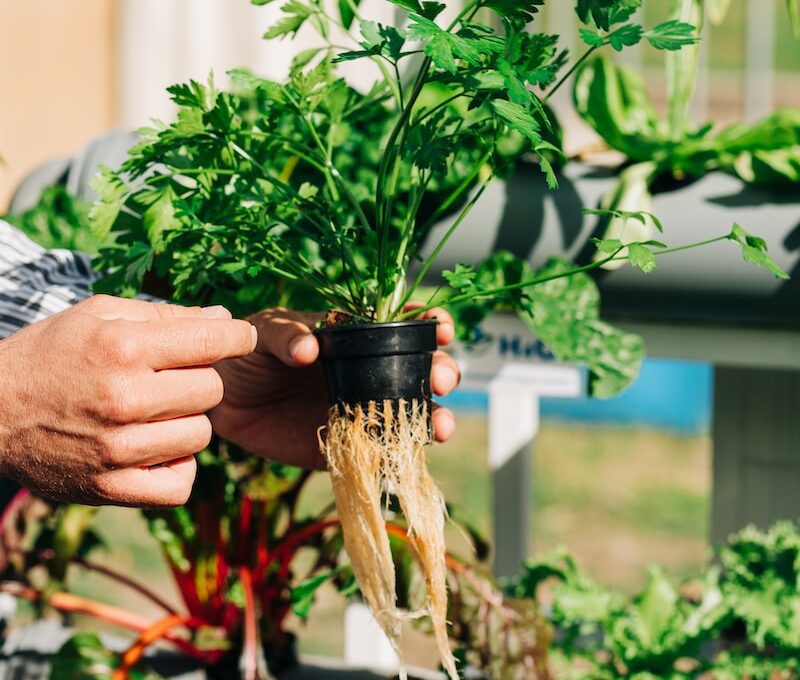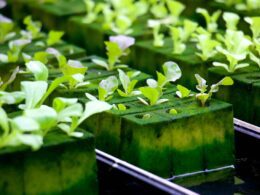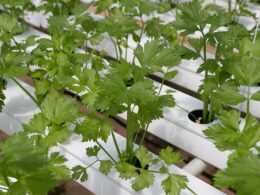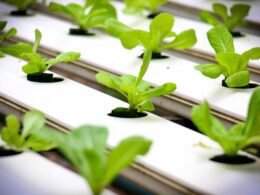Are you tired of biting into a tomato that looks ripe and juicy, only to find that it has no flavor? You’re not alone. Many people have noticed that hydroponic tomatoes often lack the taste and aroma of their soil-grown counterparts.
But why is this the case?
In this article, we’ll explore the science behind tomato flavor and how it’s affected by hydroponic farming. We’ll also discuss techniques that can be used to improve the taste of hydroponic tomatoes.
By the end of this article, you’ll have a better understanding of why hydroponic tomatoes can be tasteless and what can be done to enhance their flavor.
Understanding Hydroponic Farming
You won’t believe how much modern farming techniques have changed the way we grow and consume our produce. Hydroponic farming is one of the latest techniques that has become increasingly popular in recent years. It involves growing plants in a nutrient-rich solution instead of soil. This method is cost-efficient and sustainable as it uses less water and eliminates the need for pesticides and herbicides.
However, hydroponic farming has its drawbacks. One of the most significant issues is that hydroponic tomatoes tend to lack flavor. This is because the plants are grown in a controlled environment and don’t receive the same nutrients as those grown in soil.
The lack of soil also means that the tomatoes don’t absorb the same minerals and micronutrients that make them taste delicious.
Despite this, hydroponic farming has its benefits. It allows farmers to grow crops all year round, regardless of the weather conditions outside. It also enables them to produce higher yields in smaller spaces, making it an excellent option for urban areas.
With the right nutrients and care, hydroponic tomatoes can still taste great, even if they may not have the same depth of flavor as those grown in soil.
The Science Behind Tomato Flavor
Take a moment to consider the complex and dynamic chemical reactions that occur within a ripe tomato, which ultimately determine its unique and delicious flavor. Tomato genetics play a significant role in the development of flavor. Some tomato varieties are naturally more flavorful than others due to their genetic makeup. However, environmental factors can also have a significant impact on the flavor of a tomato.
Here are some environmental factors that can affect tomato flavor:
-
Soil quality: The nutrients in the soil can significantly impact the flavor of a tomato. Tomatoes grown in nutrient-rich soil tend to be more flavorful than those grown in nutrient-poor soil.
-
Temperature: Tomatoes grown in warm temperatures tend to develop more flavor than those grown in cooler temperatures.
-
Sunlight exposure: Tomatoes that receive plenty of sunlight tend to be sweeter and more flavorful than those that do not receive enough sunlight.
-
Watering: Overwatering or underwatering can both negatively impact tomato flavor. Tomatoes that are overwatered tend to have a diluted flavor, while those that are underwatered can develop a bitter taste.
In conclusion, while tomato genetics play a significant role in determining flavor, environmental factors can also have a big impact. Hydroponic tomatoes may be less flavorful because they’re grown in a controlled environment where factors like soil quality and sunlight exposure are carefully regulated. As a result, hydroponic tomatoes may not develop the same complex and dynamic flavor as their soil-grown counterparts.
The Impact of Hydroponic Farming on Tomato Flavor
If you’re a tomato lover, you might be curious about how the way they’re grown can affect their flavor. One major factor that can impact tomato flavor is the farming method. Soil-based farming has been the traditional method for growing tomatoes, but hydroponic farming has become increasingly popular in recent years. Unfortunately, hydroponic tomatoes have been criticized for their lack of flavor, leaving many consumers wondering why.
Soil-based farming allows tomatoes to absorb nutrients and minerals from the soil, which can contribute to their flavor. Hydroponic farming, on the other hand, involves growing plants in nutrient-rich water instead of soil. While this method can be more efficient and environmentally friendly, it can also result in tomatoes with less flavor. A study found that soil-grown tomatoes were preferred by consumers over hydroponic tomatoes when it came to taste, aroma, and overall quality.
Consumer preferences play a significant role in the popularity of hydroponic farming. While some may prioritize sustainability and efficiency over flavor, others may be willing to pay more for soil-grown tomatoes with better taste. Ultimately, understanding the impact of farming methods on tomato flavor can help consumers make informed decisions about the products they purchase.
Techniques for Improving Tomato Flavor in Hydroponic Systems
If you’re looking to improve the flavor of your hydroponic tomatoes, there are a few techniques you can try.
First, consider enhancing your nutrient solutions with organic fertilizers or trace minerals.
Additionally, introducing beneficial microbes into your hydroponic system can help stimulate plant growth and improve flavor.
Finally, adjusting the light and temperature in your growing environment can also play a role in enhancing the taste of your tomatoes.
Enhancing Nutrient Solutions
By fine-tuning the nutrient solutions used in tomato cultivation, you can enhance the flavor of your hydroponic tomatoes. One way to do this is by adjusting nutrient ratios. For example, increasing the amount of potassium can improve the taste of your tomatoes, as it helps with sugar production.
Additionally, making sure that your nutrient solution has the right pH balance can also make a difference. Tomatoes prefer a slightly acidic environment, with pH levels between 5.5 and 6.5. If your pH levels are too high or too low, it can affect the uptake of nutrients and ultimately impact the taste of your tomatoes.
Another technique to enhance your nutrient solution is through the use of organic additives. By adding organic matter such as fish emulsion or kelp, you can provide your tomatoes with additional micronutrients that can contribute to a richer flavor profile.
Additionally, compost tea can be used to introduce beneficial microbes to your hydroponic system, which can help your plants uptake nutrients more efficiently and lead to better-tasting tomatoes.
By incorporating these techniques into your hydroponic tomato cultivation, you can elevate the flavor of your crops and provide your customers with a delicious and high-quality product.
Introducing Beneficial Microbes
Introducing beneficial microbes into your nutrient solution can significantly improve the overall health and flavor of your crops. Beneficial microbe applications are becoming increasingly popular in hydroponic farming as they can help promote healthy microbial community dynamics within your plants’ growing environment. These microorganisms can help break down organic matter into plant-available nutrients, which can lead to better plant growth and development.
One way to introduce beneficial microbes into your hydroponic system is by using microbial inoculants. These inoculants contain a variety of beneficial microorganisms, such as mycorrhizal fungi, which can help your plants absorb nutrients more efficiently. Another way to encourage microbial growth is by adding compost tea to your nutrient solution. Compost tea is a liquid fertilizer that contains a diverse population of microorganisms that can help improve soil structure and nutrient availability. By incorporating these beneficial microbes into your hydroponic system, you can help create a healthy, thriving environment that will produce flavorful, nutritious tomatoes.
Adjusting Light and Temperature
Let’s explore how adjusting the light and temperature in your growing setup can enhance the health and flavor of your plants.
One way to improve the flavor of your hydroponic tomatoes is by manipulating the light spectrum. Plants need different wavelengths of light for different stages of growth. By providing the correct spectrum of light, you can enhance the flavor, color, and nutrient content of your tomatoes. For example, blue light can promote leaf growth, while red light encourages flowering and fruiting. By using a combination of blue and red lights, you can create an optimal light spectrum that promotes healthy growth and delicious flavor.
Another factor that affects the taste of your hydroponic tomatoes is temperature. Tomatoes thrive in warm temperatures, but excessive heat can cause stress and reduce the flavor of the fruit. Cooling techniques, such as evaporative cooling or air conditioning, can help maintain a consistent temperature in your growing environment.
It’s also important to monitor the humidity levels, as high humidity can lead to disease and reduce the flavor of your tomatoes. By controlling the temperature and humidity in your setup, you can create a comfortable and healthy environment for your plants, resulting in better-tasting tomatoes.
Conclusion and Future Directions
So what’s the secret to unlocking the full flavor potential of this beloved fruit? Let’s explore some exciting avenues for future research and development.
One area to consider is nutrient balance. Hydroponic systems rely on nutrient solutions to provide essential plant nutrients, but getting the balance just right can be tricky. Research in this area could lead to a better understanding of the nutrient requirements for optimal taste and flavor.
Another potential avenue for future research is genetic modification. By selectively breeding or genetically engineering tomato plants, researchers may be able to enhance the flavor profile of hydroponic tomatoes. For example, a recent study found that introducing a gene associated with fruit ripening led to increased levels of flavor compounds in tomatoes. Further research in this area could lead to more flavorful hydroponic tomatoes.
In summary, while hydroponic tomatoes may have a reputation for being tasteless, there is hope for the future. Nutrient balance and genetic modification are just two of many exciting areas for future research and development. By unlocking the secrets to producing more flavorful hydroponic tomatoes, we can continue to enjoy this delicious and versatile fruit for years to come.
Frequently Asked Questions
What are some common misconceptions about hydroponic farming and tomato flavor?
You may have heard some misconceptions about hydroponic farming and tomato flavor. Some people believe that hydroponic tomatoes are tasteless and lack quality compared to traditional soil-grown tomatoes. However, this isn’t necessarily true.
In fact, hydroponic farming can offer several benefits, such as more efficient use of water and nutrients, and the ability to grow crops in areas where soil conditions are poor. Taste and quality depend on many factors, including the specific variety of tomato, the nutrients and growing conditions provided, and how the tomatoes are harvested and stored.
So don’t be quick to judge hydroponic tomatoes based on misconceptions, and give them a try for yourself to see if you notice a difference in taste and quality.
Are there any differences in nutritional value between hydroponic tomatoes and conventionally grown tomatoes?
Are you curious about the differences in nutrient composition between hydroponic and conventionally grown tomatoes? It’s a common question among those interested in the growing techniques of these two methods.
While both types of tomatoes contain similar nutrients, hydroponic tomatoes have been found to have higher levels of vitamin C and antioxidants. This is because the controlled environment of hydroponic farming allows for precise nutrient delivery, resulting in optimal plant growth and development.
So, while some may argue that hydroponic tomatoes lack flavor, they still offer comparable nutritional value to conventionally grown varieties.
How do environmental factors like temperature and humidity impact the flavor of hydroponic tomatoes?
To achieve the best flavor in hydroponic tomatoes, you need to keep an eye on the temperature and humidity.
Temperature variations can have a big impact on the taste of your tomatoes. Cooler temperatures lead to a sweeter flavor, while warmer temperatures lead to a more acidic taste.
Humidity levels also play a role. Low humidity leads to a dryer, less flavorful tomato.
By monitoring these environmental factors, you can ensure that your hydroponic tomatoes have the best possible taste.
Can hydroponic systems be modified to enhance the flavor of tomatoes?
Want to enhance the flavor of your hydroponic tomatoes? There are several techniques you can try.
One option is to modify your hydroponic system. Try changing the growth medium by incorporating soil or coco coir into the mix. This can provide a more complex flavor profile for your tomatoes.
Another option is to adjust the nutrient levels and pH balance of your hydroponic system. This can also impact the taste of your tomatoes. Experiment with different nutrient solutions and pH levels to find the perfect balance for your desired flavor.
With these modifications, you can enjoy delicious and flavorful hydroponic tomatoes.
Is there a significant difference in taste between hydroponic tomatoes grown in different regions or countries?
If you’re curious about the taste of hydroponic tomatoes in different regions or countries, you’ll be interested to know that there are indeed regional taste variations.
This is due to the different growing techniques used by farmers in different areas.
For example, tomatoes grown in the Netherlands tend to be more uniform in size and shape, while those grown in Italy are known for their strong, sweet flavor.
So if you’re looking for a specific taste in your hydroponic tomatoes, it’s worth doing some research on the growing techniques used in that particular region.
Conclusion
So, now you know why hydroponic tomatoes often lack flavor. Hydroponic farming has many benefits, but it can also have a negative impact on the taste of certain crops, including tomatoes. This is because hydroponic systems are designed to maximize yield and growth speed, often at the expense of flavor.
But don’t worry, there are techniques that can be used to improve the flavor of hydroponic tomatoes. From adjusting nutrient levels to selecting the right cultivars, there are ways to create flavorful, high-quality tomatoes in hydroponic systems.
With continued research and development, the future of hydroponic farming looks promising for both efficiency and taste.








